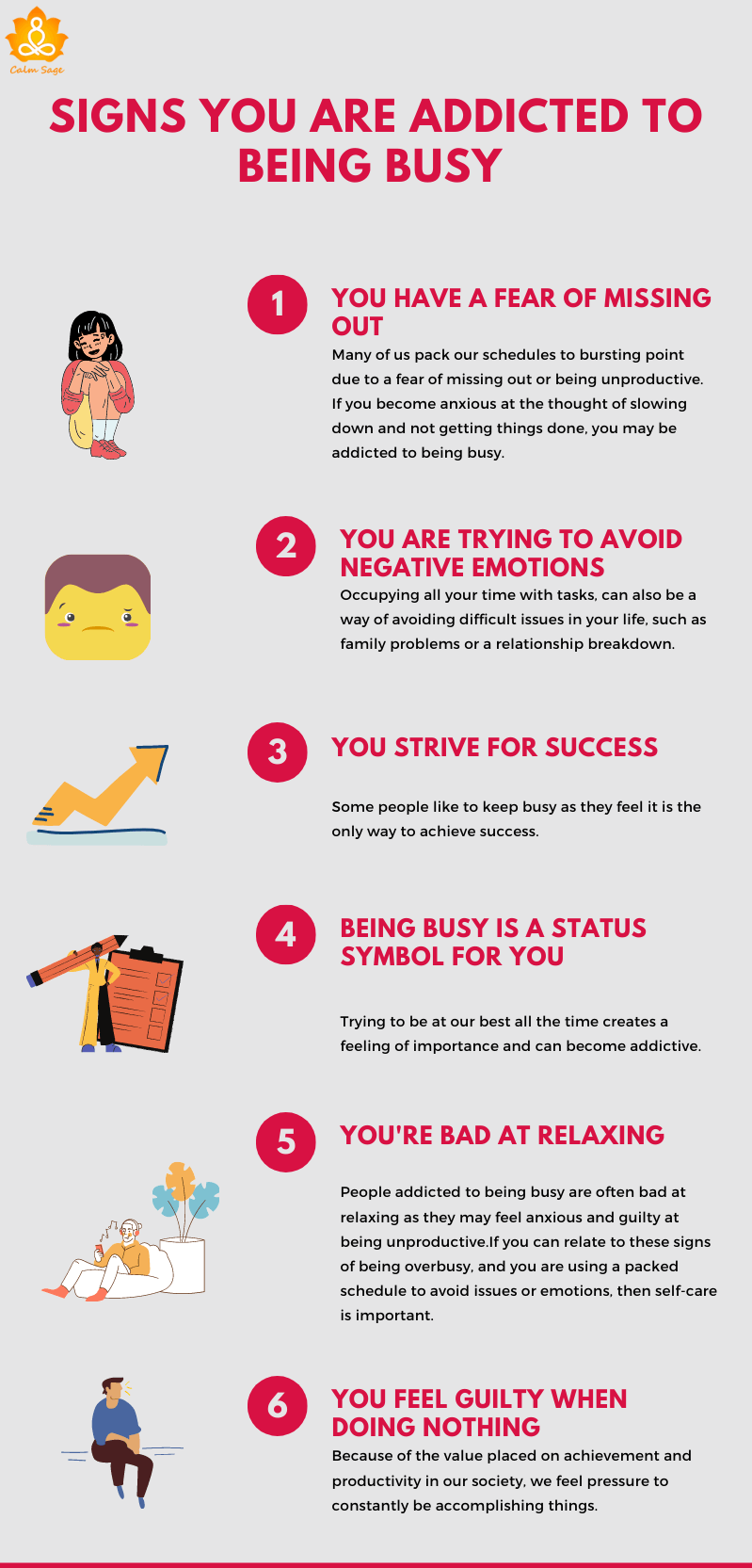Is ‘Staying Busy’ Your Coping Mechanism?

“I wanted to figure out why I was so busy, but I couldn’t find the time to do it.” – Todd Stocker
The art of staying busy all the time looks like hard work, doesn’t it? In truth, many people use the excuse of ‘busyness’ or staying busy as a coping mechanism and to avoid dealing with their feelings. This could turn into an obsession that can cause more harm than help to your life and health.
Keeping busy to avoid anxiety or other unpleasant feelings at all times could also affect your self-esteem and self-worth. The more you feel the need to stay busy all the time, the more you try to avoid your present. It is said that when a person isn’t happy or satisfied with how their life is turning, the more they stay busy. While the need to be busy all the time can help keep our minds off of things, it can also increase our stress, anxiety, and mental strain.
“We use busyness as a distraction from painful feelings. When your to-do list is constantly throwing appointments after appointments at you, you don’t have the space to catch your breath much less reflect on seriously painful lingering emotions.” – Nick Wignall, psychologist
Many people have been using ‘busyness’ or staying busy as a coping mechanism for years. The need to stay busy all the time keeps them away from feeling, thinking, and acting on negative emotions. This ‘busyness’, in turn, increases anxiety, stress, and fatigue causing a person to feel burned out.
Signs You’re Staying Busy To Avoid Feelings
1. Your Calendar Is Always Full
Your calendar is always cluttered and full. If you’re staying busy to avoid feelings, you might face difficulty in not doing anything. The need to have a full schedule might overpower your need to be doing something non-meaningful.
2. You Like Being Socially Connected
You like being socially connected at all times. You have a constant desire to go from one social activity to another and have difficulty staying alone and spending time with yourself. This need to be around others might stem from a lonely childhood where we would try to keep ourselves busy to avoid depression and loneliness.
3. You Can’t Seem To Slow Down
You are constantly “on the go” and don’t often notice the small things around you. You can’t remember what your morning tea tasted like, the smile your partner gave you before you left for work, or the sounds of the morning traffic. These little things are easily forgotten and you can’t seem to slow down enough to savor the moments. These are also signs that you’re keeping busy to avoid the anxiety of the day.

What To Do?
1. Acknowledge & Accept
Accepting your need to be busy all the time is a coping mechanism that is the first step. Recognizing and admitting your need to stay busy to avoid feelings is the best way to help yourself fix this issue. Ask yourself; what is the activity offering you? How do you feel with a full schedule? How do you feel with an empty schedule?
Also Read: The Power of Self Acceptance: Ways To Accept Yourself
2. Opt For “Me Time”
Taking some time off for and with yourself is also a good way to begin fixing your need to stay busy all the time. Loneliness can be harmful but having a “me time” now and then can help you understand what you’re feeling and what you need to do to help change whatever is the reason you’re using ‘staying busy’ as a coping mechanism or as an excuse.
3. Understand Your Need
Ask yourself why do you need to stay busy? What is it that you’re avoiding? Why do you need to numb yourself from feeling emotions? Understanding this need can help you solve your addiction to the need to stay busy all the time.
If you need, you can also talk to a professional to get the proper guidance and support to help you understand your feelings and the causes of your busyness.
4. Slow Down
If you feel like you don’t have much time to spare and if you realize that you’re staying busy as a coping mechanism – take a deep breath, take a break, pause, and notice the small things around you. Whenever the need arises to do something or the need to be busy, slow down, and listen to yourself. Ask yourself the reason you are staying busy.
Frequently Asked Questions
Q1: Why do I feel the need to stay busy?
The need to stay busy comes if you feel anxious when not busy. Staying busy all the time can also be a way to avoid feelings and unpleasant thoughts including social problems, family issues, relationship problems, break up, etc. You need to understand where the feeling that you need to stay busy comes from and then address it accordingly.
Q2: Is staying busy a coping mechanism?
Staying busy is a productive thing but when the line between staying productive and staying busy blurs, then it could be an issue. When you feel that the need to stay busy has taken over your life and your relationships, then it’s a sign that staying busy has become a coping mechanism. If you’re staying busy as a coping mechanism, then you should seek therapy.
Q3: Does keeping yourself busy help anxiety?
Did you know that most of your anxiety comes from the fear of anxiety itself? While staying busy all the time may help you avoid thinking about your anxiety, it can still drain you and leave you feeling anxious when you have nothing to stay busy for. Stay busy but stay productive to keep your anxiety away.
Q4: What is it called when someone has to be busy all the time?
When someone keeps them busy all the time, then they could be called a workaholic. Most of the times a workaholic keeps themselves busy to either avoid their feelings, feel in control, or when they want to keep their anxiety away. Staying busy is not a bad thing but you shouldn’t use staying busy as a coping mechanism or an escape from unpleasant thoughts.
Final Words
In our society, staying busy means being productive and working hard to achieve our goals and dreams. But using ‘busyness’ or staying busy to avoid feelings or as a coping mechanism can be harmful and unhealthy.

I’m not saying that staying busy all the time is a bad thing. It can be a good thing under the right circumstances but it is unhealthy when feeling the need to be busy all the time interferes with your life and makes you not enjoy the small yet important things in your life.
Slow down, pause, and breathe. If you feel like the need to be busy all the time is harming your relationship with yourself and with those around you, talk to a professional mental healthcare provider. Seeking help and changing your coping strategy from ‘busyness’ to something more healthy could be helpful.
“One of the most universal numbing strategies is what I call crazy-busy. I often say that when they start having 12-step meetings for busy-aholics, they’ll need to rent out football stadiums. We are a culture of people who’ve bought into the idea that if we stay busy enough, the truth of our lives won’t catch up with us.” – Brené Brown
I hope this blog can help you understand how you’re using ‘staying busy’ as a coping mechanism, a way to avoid feelings, or just an excuse to escape unpleasant emotions. For more, you can DM us on social media or write to us at info@calmsage.com.
You can also share your thoughts on the need to be busy all the time in the comments section below.
Take Care.





















I had no idea that staying busy could be a coping mechanism. Thanks for this article.
A busy mind is out of negativity but don't forget to have some 'Me Time' for self!
Thanks for letting me what is the difference between being busy and using work as coping mechanism
I have been saying for years my way of coping with anything and everything is to work. Any work, even the garbage, I have to have a feeling of being useful and productive even if it is a mundane job. I am retired (78), I have to have something to do. If I have nothing to do I get anxious and I want to eat.